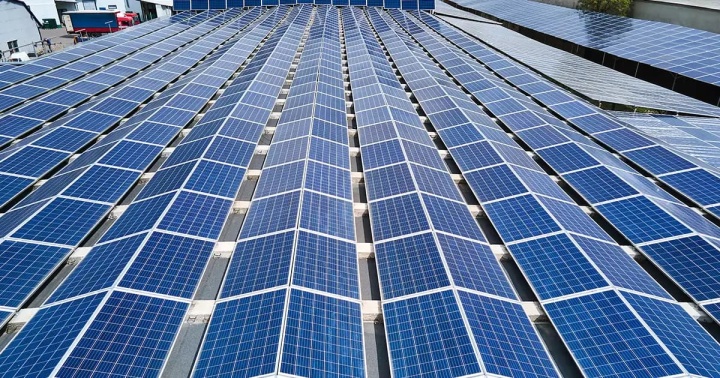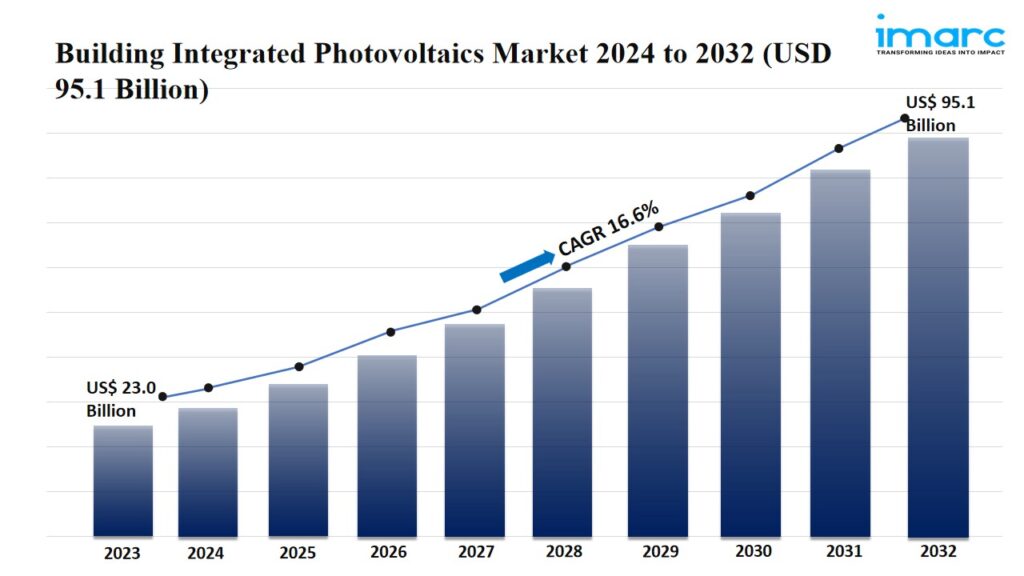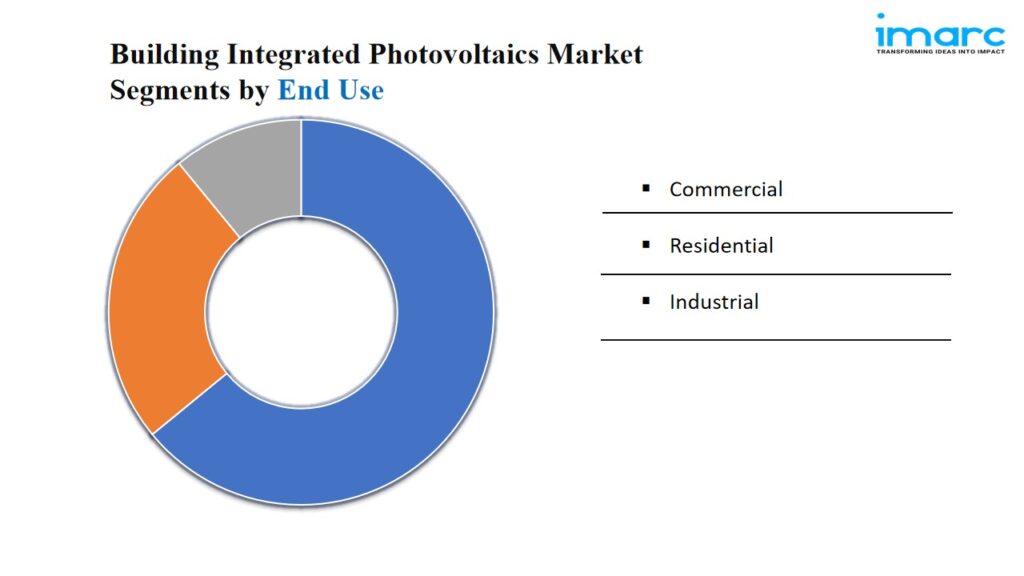

IMARC Group’s report titled “Building Integrated Photovoltaics Market Report by Product Type (Polycrystalline, Thin Film, and Others), Application (Roof, Facades, Glass, and Others), End Use (Commercial, Residential, Industrial), and Region 2024-2032“. The global building integrated photovoltaics market size reached US$ 23.0 Billion in 2023. Looking forward, IMARC Group expects the market to reach US$ 95.1 Billion by 2032, exhibiting a growth rate (CAGR) of 16.6% during 2024-2032.

Grab a free sample PDF of this report: https://www.imarcgroup.com/building-integrated-photovoltaics-market/requestsample
Factors Affecting the Growth of the Building Integrated Photovoltaics Industry:
The global shift towards sustainable construction practices is driving the demand for building integrated photovoltaics (BIPV). Governments worldwide are implementing stricter regulations on carbon emissions and energy efficiency, encouraging the building sector to adopt greener technologies. BIPV systems seamlessly integrate into building envelopes, such as roofs, facades, and windows, while generating electricity, thereby reducing the reliance on external sources of power and diminishing the overall carbon footprint of buildings. Additionally, advancements in photovoltaic technology have resulted in more aesthetically pleasing and energy-efficient BIPV solutions, which are increasingly preferred by architects and developers looking to meet both environmental targets and consumer demand for sustainable living solutions.
The evolution of technology in the photovoltaics industry is leading to significant improvements in the efficiency and integration capabilities of BIPV systems. Enhanced photovoltaic materials, such as thin-film solar cells and organic photovoltaics, are expanding the application range of BIPV, enabling integration into varied building surfaces without compromising structural design. Moreover, as manufacturing processes improve and scale, the costs associated with BIPV components are decreasing, making BIPV solutions more accessible and economically viable for a broader market.
The utilization of BIPV is heavily supported by government initiatives and financial incentives aimed at promoting renewable energy sources. Many countries offer subsidies, tax incentives, and grants to encourage the adoption of photovoltaic technology in building applications. These financial incentives not only lower the starting costs required for BIPV installations but also enhance the overall return on investment over time. Moreover, feed-in tariffs and net metering policies allow excess energy produced by BIPV systems to be added back to the grid, providing additional economic benefits to building owners. This governmental support is crucial in making BIPV systems a feasible and attractive option for developers and investors in the construction sector.
Leading Companies Operating in the Global Building Integrated Photovoltaics Industry:

Building Integrated Photovoltaics Market Report Segmentation:
By Product Type:
Polycrystalline represents the largest segment due to its cost-effectiveness compared to other types of solar cells, such as monocrystalline silicon.
By Application:
Roofs hold the biggest market share owing to the increasing construction of luxury residential and commercial buildings.
By End Use:

Commercial exhibits a clear dominance in the market as BIPV is ideally suited for office buildings, where it can be integrated into facades, roofs, and windows to generate electricity while maintaining aesthetic appeal.
Regional Insights:
Europe’s dominance in the building integrated photovoltaics market is attributed to investment in green building practices to reduce the carbon footprint of construction procedures.
Global Building Integrated Photovoltaics Market Trends:
Companies are focussing on corporate social responsibility (CSR) policies that prioritize sustainability and environmental stewardship. This commitment often translates into investments in green building practices, including the adoption of BIPV technologies. Moreover, building projects that incorporate BIPV solutions are more likely to achieve higher ratings under green building certification programs. These certifications not only improve the marketability of buildings and potentially their resale value but also align with corporate goals of reducing environmental impact and promoting sustainability. The drive for CSR and the pursuit of certification are powerful incentives for stakeholders in the building industry to integrate photovoltaic technology into their architectural designs.
Note: If you need specific information that is not currently within the scope of the report, we will provide it to you as a part of the customization.
About Us:
IMARC Group is a leading market research company that offers management strategy and market research worldwide. We partner with clients in all sectors and regions to identify their highest-value opportunities, address their most critical challenges, and transform their businesses.
IMARCs information products include major market, scientific, economic and technological developments for business leaders in pharmaceutical, industrial, and high technology organizations. Market forecasts and industry analysis for biotechnology, advanced materials, pharmaceuticals, food and beverage, travel and tourism, nanotechnology and novel processing methods are at the top of the companys expertise.
Our offerings include comprehensive market intelligence in the form of research reports, production cost reports, feasibility studies, and consulting services. Our team, which includes experienced researchers and analysts from various industries, is dedicated to providing high-quality data and insights to our clientele, ranging from small and medium businesses to Fortune 1000 corporations.
Contact Us:
IMARC Group
134 N 4th St. Brooklyn, NY 11249, USA
Email: sales@imarcgroup.com
Tel No:(D) +91 120 433 0800
United States: +1-631-791-1145
